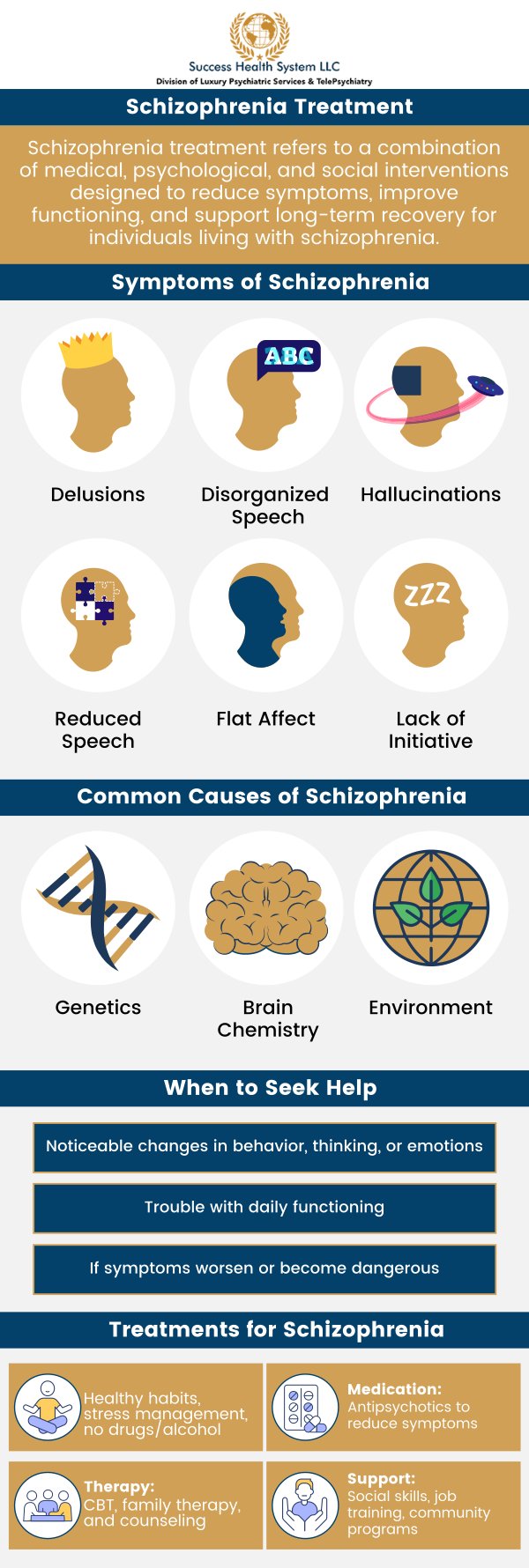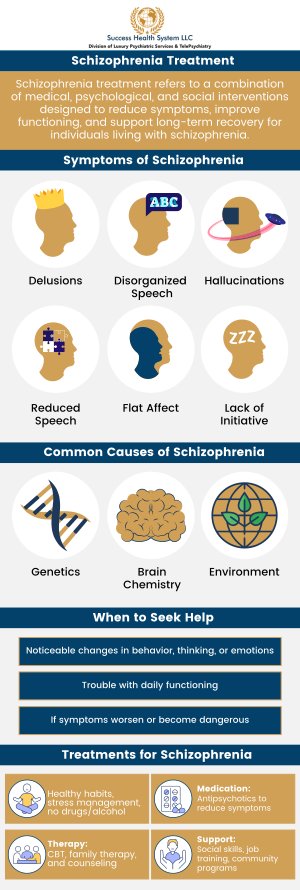Schizophrenia Doctor in Independence, MO
Schizophrenia is a complex mental health condition that can impact daily life, relationships, and overall well-being. At Success Health System LLC, Dr. Moses Tabe Ambilichu, M.D., provides compassionate and specialized care for individuals living with schizophrenia. With a focus on accurate diagnosis, personalized treatment plans, and ongoing support, Dr. Ambilichu helps patients better manage symptoms such as hallucinations, delusions, and disorganized thinking. Our approach aims to improve quality of life and provide individuals and families with the tools they need for long-term stability and recovery. For more information, contact us today or schedule an appointment online. We are conveniently located at 4429 S River Blvd Ste D, Independence MO, 64055.




Table of Contents:
What is Schizophrenia?
What are the signs and symptoms of Schizophrenia?
How is Schizophrenia diagnosed?
How is Schizophrenia treated?
Whilst many people know, and accept, that mental health disorders are a way of life, the stigma surrounding schizophrenia often leaves individuals with a very distorted view of the disease and those who live with it. It is a misrepresentation, often perpetuated by the media, that leaves many people diagnosed with schizophrenia vulnerable to being misunderstood and treated as unstable, and even frightening. In fact, most people with schizophrenia are no more dangerous or violent than those in the general population, and these misconceptions can often lead them to become isolated and receive a lower standard of care.
Schizophrenia is a brain disorder that affects a very small part of the U.S. population – less than one percent – and is considered a chronic condition due to the fact that those who have it can see repeated episodes throughout their life. Whilst a cure for schizophrenia has not yet been discovered, ongoing research is leading to more innovative and safer treatments; experts are also seeking to understand the causes of the disease by studying genetics, conducting behavioral research, and examining the brain’s structure and function. It’s been a commonly held belief that schizophrenia means either a split- or multiple-personality, but this is not the case. Another misconception is that people with schizophrenia are often homeless and end up living in hospitals or institutions, whereas the reality is that most live with families or in group homes. Schizophrenia affects both men and women in fairly equal numbers, but studies have shown that the earlier onset of the disease is more common in males, who often experience the initial symptoms in their late teens to early 20s. Women generally tend to exhibit the first signs of the disease in their 20s and early 30s.
As with any illness, the frequency, severity, and duration of symptoms of schizophrenia can vary, however, someone with schizophrenia may notice that the incidence of severe psychotic symptoms may diminish as they get older. Conversely, an increase in symptoms can be attributed to not taking prescribed medications as directed, the use of alcohol or illicit drugs, and stressful situations.
The symptoms of schizophrenia fall into three main groups:
• Positive – hallucinations, paranoia, exaggerated or false perceptions, beliefs, and behavior.
• Negative – characterized by a diminished ability to make plans, speak, express emotion, or find pleasure.
• Disorganized – symptoms that cause confusion, illogical thoughts, disordered speech, and sometimes strange behavior or abnormal movements.
Cognitive actions can also be affected and can result in decreased functions in memory, attention, and concentration.
According to the American Psychiatric Association, a diagnosis of schizophrenia is made when a person has exhibited two or more core symptoms (one of which must be hallucinations, delusions, or disorganized speech) for at least one month. Other core symptoms are gross disorganization and reduced emotional expression. When making the diagnosis the psychiatrist will also determine whether the person has exhibited these, or other, symptoms for at least six months. A thorough medical examination should also be performed to rule out other potential causes such as substance misuse or other neurological or medical conditions that can be mistaken for schizophrenia.
The main types of treatment for schizophrenia are counseling and medication. Medicines will control psychotic symptoms in most people, but those with less severe cases may not need them. Those who take medications will find that:
• The hallucinations either lessen or stop;
• They are better able to distinguish between hallucinations and the real world;
• Feelings of confusion are diminished;
• Cognitive functions are clearer.
Some people may, mistakenly, believe that the medications have done their job by reducing or stopping their symptoms and decide to stop taking them because they feel they are no longer needed. Another reason that people may discontinue their medication is if they experience undesirable side effects, but this often results in the return of the symptoms, so it is always important to seek medical advice before discontinuing any course of medication.
We specialize in psychiatric medication management, telepsychiatry, and treatment for all types of mental health conditions. For more information, contact us today or schedule an appointment online. We are conveniently located at 4429 S River Blvd Ste D, Independence MO, 64055. We serve patients from Independence MO, Raytown MO, Sugar Creek MO, Blue Springs MO, Kansas City MO, Lee’s Summit MO and surrounding areas.

Check Out Our 5 Star Reviews


Additional Services You May Be Interested In
▸Addiction Treatment
▸ADHD Treatment
▸Anxiety Treatment
▸Bipolar Disorder
▸Depressive Disorders
▸Mental Disorder
▸Obsessive Compulsive Disorders
▸Psychotic Disorders
▸PTSD Treatment
▸Phobias and Fears Therapist
▸Psychiatrist
▸Substance Disorder
▸Social Anxiety Psychiatrist
▸Medication Management
▸Psychotherapy
▸Exomind TMS – Columbia
▸Spravato – Independence

Additional Services You May Be Interested In
▸Addiction Treatment
▸ADHD Treatment
▸Anxiety Treatment
▸Bipolar Disorder
▸Depressive Disorders
▸Mental Disorder
▸Obsessive Compulsive Disorders
▸Psychotic Disorders
▸PTSD Treatment
▸Phobias and Fears Therapist
▸Psychiatrist
▸Substance Disorder
▸Social Anxiety Psychiatrist
▸Medication Management
▸Psychotherapy
▸Exomind TMS – Columbia
▸Spravato – Independence





